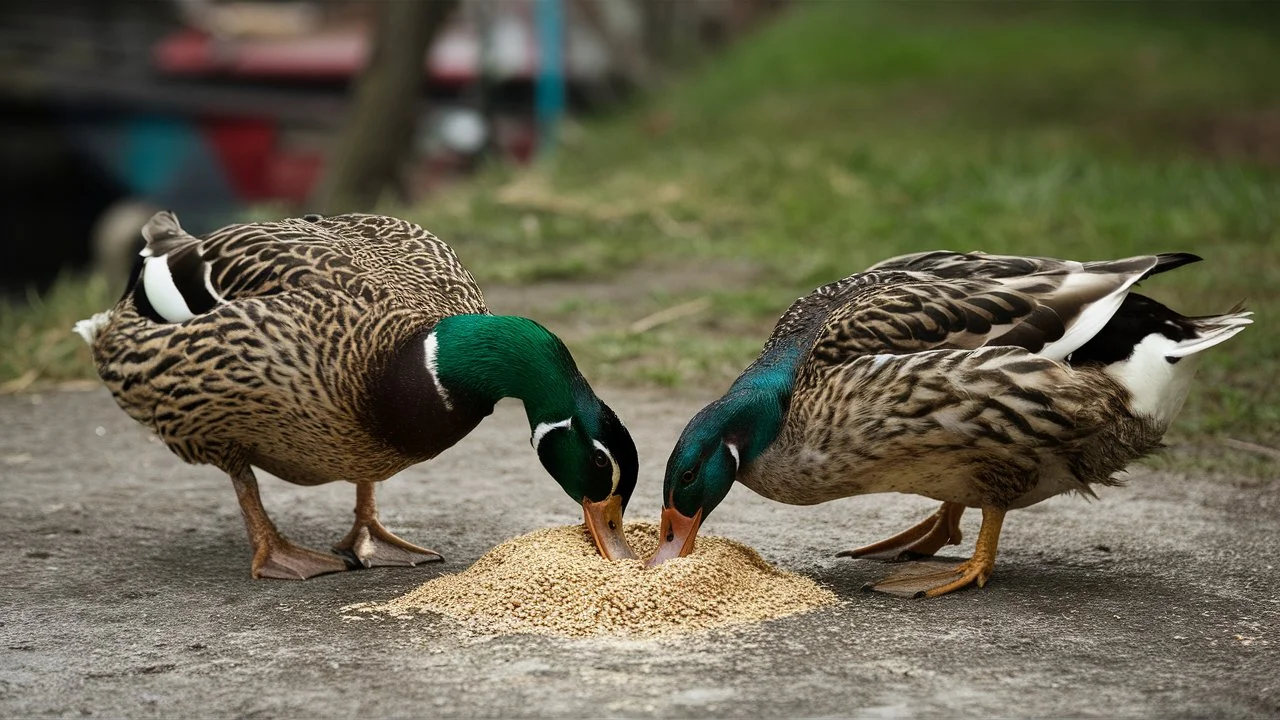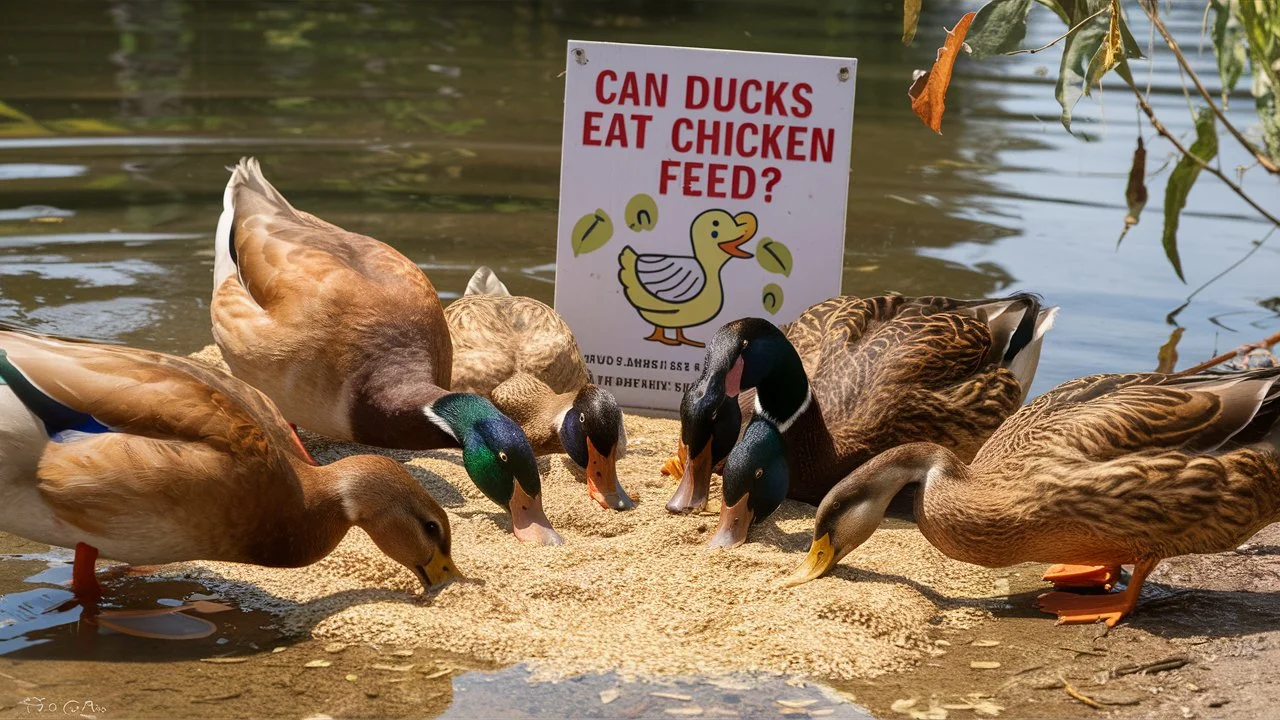Ducks are delightful and engaging creatures, often kept for their eggs, meat, and the joy they bring to any backyard or farm setting. One question that frequently arises among duck keepers is whether ducks can be fed chicken feed. While the answer is yes, it is essential to understand that ducks have specific nutritional needs that differ from chickens.
Properly addressing these needs is vital to their health and well-being. This comprehensive guide will delve into the nuances of feeding ducks chicken feed, highlighting the necessary adjustments and best practices to ensure your ducks receive a balanced and nutritious diet. By exploring the unique dietary requirements of ducks, the types of chicken feed that are most suitable, and important feeding strategies, you can provide optimal care for your feathered friends.
Yes, ducks can eat chicken feed, but there are important considerations to ensure their health. Ducks, especially ducklings, need higher protein levels and more niacin than chickens. Using unmedicated starter feed with added niacin for ducklings and grower feed for juveniles is recommended. For adult ducks, layer feed is suitable for laying females, but high calcium levels can be harmful to non-laying ducks and drakes. Always provide fresh water and supplement their diet with greens, grains, and protein sources for balanced nutrition.
Can Ducks Eat Chicken Feed?
Ducks are delightful and useful birds to keep, whether on a farm, in a backyard, or as pets. Their dietary needs, while similar to chickens in some respects, have specific requirements that should be met to ensure their health and well-being. One common question among duck keepers is whether ducks can eat chicken feed. The short answer is yes, ducks can eat chicken feed, but there are important considerations and modifications needed to make it suitable for them. This guide will cover everything you need to know about feeding ducks chicken feed, including nutritional needs, types of feed, feeding practices, and supplementary foods.
Related reading:Will Ducks Kill Chickens

Nutritional Needs of Ducks
Understanding the nutritional needs of ducks is essential to providing them with a balanced diet. While chickens and ducks share some dietary requirements, there are significant differences that must be addressed.
Protein Levels
Ducks, particularly ducklings, require higher protein levels than chickens during their early growth stages. Protein is crucial for their rapid growth and development. Starter feeds for chickens often have the appropriate protein content, but adjustments may be necessary for optimal duckling health.
- Ducklings: Need a protein content of around 20-22% during the first few weeks of life. This high protein level supports their rapid growth.
- Juvenile Ducks: As they grow, the protein requirement decreases. Grower feeds with 16-18% protein are suitable for ducks in this stage.
- Adult Ducks: Require less protein than growing ducklings but still benefit from a balanced diet that supports their overall health and egg production in laying females.
Niacin (Vitamin B3)
Niacin is a critical nutrient for ducks, more so than for chickens. A deficiency in niacin can lead to leg and bone problems, which can severely impact the health of your ducks.
- Sources of Niacin: Brewer’s yeast is an excellent source of niacin and can be mixed into their feed. Alternatively, niacin supplements are available and can be added to their diet.
Types of Chicken Feed Suitable for Ducks
Different types of chicken feed are available, each formulated for specific stages of a chicken’s life. When feeding ducks, it’s important to choose the right type of feed and supplement it as needed.
Starter Feed
Starter feed is designed for chicks and has a high protein content, typically around 20-22%, which is also suitable for ducklings.
- Unmedicated Starter Feed: It’s crucial to use unmedicated starter feed for ducklings. Medicated feeds, often containing coccidiostats to prevent coccidiosis in chicks, can be harmful to ducklings and should be avoided.
- Supplement with Niacin: Since starter feeds may not have enough niacin for ducklings, add brewer’s yeast or a niacin supplement to the feed.
Grower Feed
Grower feed is appropriate for juvenile ducks who no longer need the high protein levels of starter feed but still require good nutrition for growth.
- Protein Content: Typically contains 16-18% protein, suitable for growing ducks.
- Transitioning: Begin transitioning ducklings to grower feed after a few weeks on starter feed, ensuring a gradual change to avoid digestive issues.
Layer Feed
Layer feed is formulated for laying hens and contains higher calcium levels to support eggshell production.
- Calcium Content: High calcium levels are necessary for laying ducks but can be harmful to non-laying ducks and drakes (male ducks). Non-layers and drakes should not be fed layer feed regularly.
- Alternative: For mixed flocks, consider an all-purpose feed and provide supplemental calcium (such as crushed oyster shells) separately to laying ducks.
Feeding Practices for Ducks
Feeding ducks involves more than just choosing the right feed. Proper feeding practices ensure that ducks receive the nutrition they need while minimizing waste and potential health issues.
Constant Water Access
Ducks need constant access to water when eating dry feed. Water helps them swallow and digest their food properly.
- Water Dishes: Provide shallow water dishes that ducks can easily drink from. Make sure the dishes are deep enough for them to dip their beaks but not so deep that they pose a drowning risk for ducklings.
- Clean Water: Keep water dishes clean and refill them regularly to ensure ducks always have access to fresh water.
Feeding Frequency
Ducks should be fed multiple times a day, especially if they are free-ranging and foraging for part of their diet.
- Ducklings: Need frequent feeding throughout the day due to their rapid growth and high energy needs.
- Adult Ducks: Can be fed twice a day, in the morning and evening, with access to foraging opportunities during the day.
Supplementary Foods
In addition to chicken feed, ducks benefit from a varied diet that includes greens, grains, and proteins.
- Greens: Ducks enjoy leafy greens such as lettuce, kale, and spinach. These provide essential vitamins and minerals.
- Grains and Seeds: Corn, wheat, and oats can be given as treats or mixed into their regular feed.
- Insects and Protein Sources: Ducks naturally forage for insects, which provide protein. You can supplement their diet with mealworms or other protein sources.
Health Considerations
Ensuring your ducks receive proper nutrition is crucial for preventing health issues and promoting overall well-being.
Monitoring Health
Regularly check your ducks for signs of good health, including bright eyes, clean feathers, and active behavior. Monitor their legs and gait, as niacin deficiency can lead to leg problems.
Avoiding Overfeeding
While ducks enjoy eating, overfeeding can lead to obesity and other health issues. Provide balanced portions and ensure they have opportunities to forage and exercise.
Environmental Enrichment
Ducks are intelligent and curious animals that benefit from environmental enrichment.
Foraging Opportunities
Allowing ducks to forage helps satisfy their natural behaviors and provides mental stimulation.
- Safe Environment: Ensure their foraging area is safe from predators and free from harmful plants or chemicals.
- Variety: Offer a variety of foraging opportunities, including different types of vegetation and access to shallow water for dabbling.
Social Interaction
Ducks are social animals that thrive in groups. Keeping multiple ducks allows them to engage in natural social behaviors.
- Group Dynamics: Observe group dynamics and ensure there are no aggressive behaviors that could lead to stress or injury.
Conclusion
In conclusion, ducks can eat chicken feed, but it’s important to consider their specific nutritional needs, especially regarding protein and niacin levels. By choosing the appropriate type of feed, supplementing as necessary, and following good feeding practices, you can ensure your ducks remain healthy and happy. Providing a varied diet, constant access to clean water, and opportunities for foraging and social interaction will further enhance their well-being. Whether you are a novice duck keeper or an experienced farmer, understanding these aspects of duck care will help you provide the best possible environment for your feathered friends.

